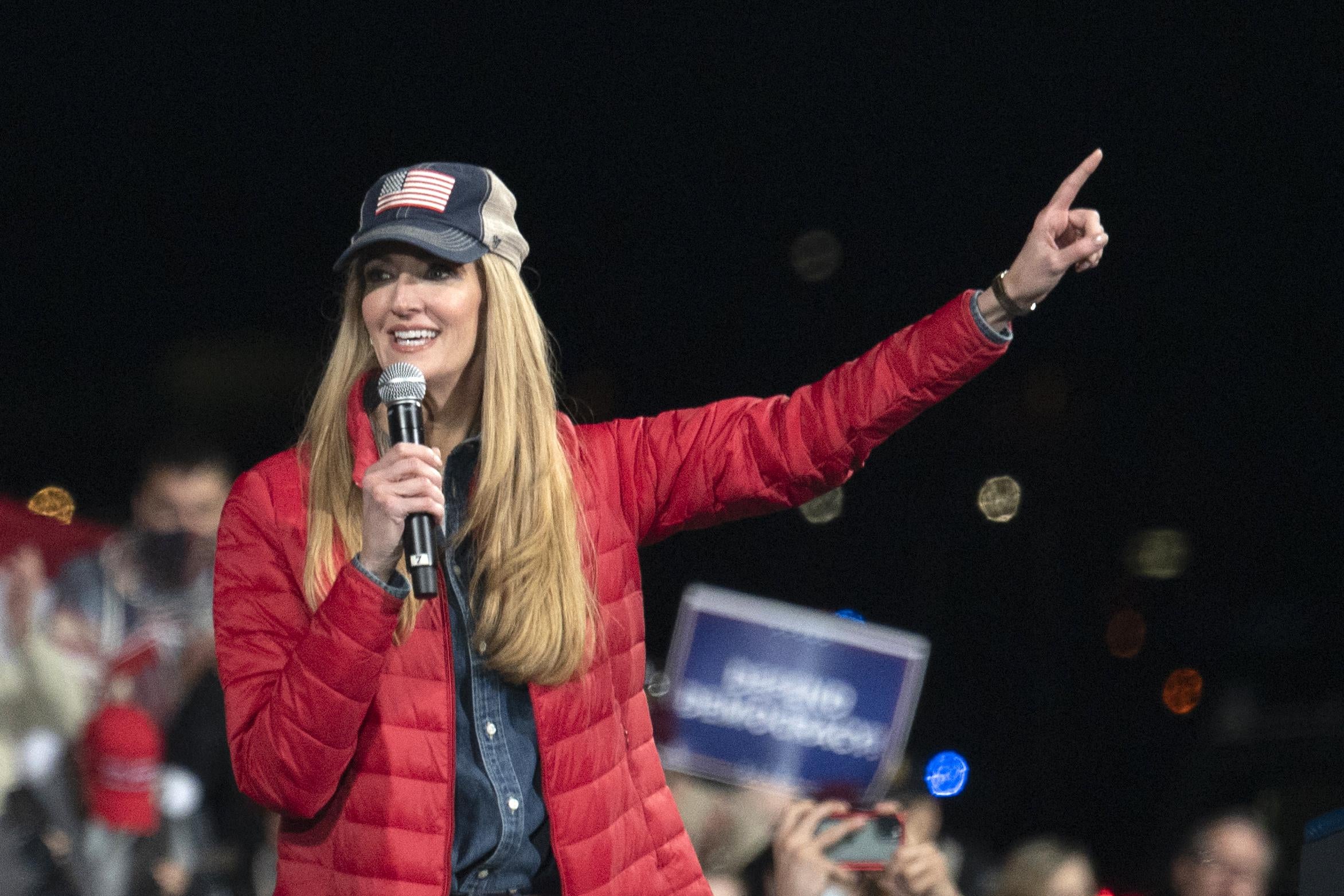Near the end of the Georgia Senate runoff debate Sunday night, moderators asked Sen. Kelly Loeffler, who was ultimately cleared in her insider trading investigation earlier this year, whether members of Congress should be barred from trading stocks.
“Look,” she responded. “What’s at stake here, in this election, is the American Dream.”
Loeffler is trying to grind out a win against Rev. Raphael Warnock more on the strength of QAnon than on that of the suburban women whom Gov. Brian Kemp felt she could appeal to when he appointed her earlier this year to the seat left empty by the retirement of Sen. Johnny Isakson. She has nothing to offer the center, now, other than parodic—which isn’t to say “unsuccessful”—efforts to slam her opponent as a radical communist who wants to defund the police.
Her debate performance Sunday night was more a mockery of this medium of voter-informing than the legendary train-wreck of a first debate between Donald Trump and Joe Biden in September. Where Trump furiously shouted fanciful warnings and accusations against his opponent, Loeffler delivered the same sort of nonsense in flat robot tones, an unmodulated voice programmed with terse attack lines from the Republican National Senatorial Committee. Nothing more, nothing less.
It’s been a long year, with much to draw from. And yet few hours of live-streamed political content have been so unsettling. Where Sen. David Perdue, defending his own seat in the other Georgia runoff, refused to show up to debate his opponent, Jon Ossoff, earlier in the evening, Loeffler was physically present but so detached from the idea of participating in a shared political reality she might as well have been absent.
In place of any engagement with the opposing candidate, the moderator, or any theoretically persuadable undecided voter, Loeffler had a set of templates she’d recycle throughout the debate. Her first was to refer to her opponent exclusively as “radical liberal Raphael Warnock” and then append three, four, five—hell, six!—buzzy horror phrases to his background and his supposed agenda. She would refuse “to be lectured” by Warnock, who “uses the Bible to justify abortion, to attack our men and women in the military,” who has “called on Americans to repent on their worship of whiteness,” and who “celebrated Jeremiah Wright, anti-Semite.” Warnock, radical liberal, “wants to distract from his own words,” calling “police officers gangsters, thugs, and a threat to our children, saying you can’t serve God and the military at the same time, attacks on Israel.”
Her first question to him, during the gimmicky Ask Your Opponent a Question segment, was, “Can you here and now, for all Georgians, renounce socialism and Marxism?” She did not swivel her head to look at Warnock as she asked this. She did not swivel her head to look at anyone. Her head did not move.
Whenever there was a question involving her wealth, as the wealthiest member of Congress, Loeffler would rattle through a rote list of working-class life experiences: Grew up on a farm, waitressed, first in her family to go to college. Her litany of everyday-person credentials did not mention the part of her life story where she married the person who is currently chairman of the New York Stock Exchange.
Where Loeffler predictably had the most difficulty, though, was in navigating the obvious conundrum in which she cannot acknowledge the mathematically certain and certified president election result in which Joe Biden defeated Donald Trump. The official electoral institutions of the state of Georgia—which she’s calling on voters to use, on her behalf, in January—have certified, audited, and recounted the fact that Biden won the balloting there. But she can’t say so, or otherwise distance herself from the president’s barrage of frivolous lawsuits and conspiracy theories claiming he’s the rightful winner, because she needs the support of both Trump and his voters.
Of the many times in which Loeffler was asked whether she believed Trump’s false post-election narrative, Warnock asked her the most succinct version: “Did Donald Trump lose the presidential election?” Her answer was another version of the stock answer she repeated throughout the night, declaring that “President Trump has every right to use every legal recourse available,” and then pivoting to the stakes of turning out on Jan. 5.
When the moderator made the necessary point that none of the terrible things she’s accusing Democrats of wanting would happen if Donald Trump were president next year—indeed, the Georgia runoffs wouldn’t be determining Senate control in that scenario either—Loeffler simply played another few hits about the radicalism of the Democratic Party.
Warnock didn’t bother rebutting all of this, dismissing her lump-sum transmissions of negatively connoted words as lies and distractions and trying more to offer an optimistic alternative. Aside from some questions about her stock trades and why she went out of her way over the summer to antagonize the Black players on the professional basketball team that she owns, he mostly tried to avoid inflaming her supporters and the many Republican base voters whose minds, like the president’s, are not presently responsive to real-world events on Planet Earth. He tried to stay above the muck. But even with her eerie delivery and unsporting attachment to the president’s make-believe narrative of mass election irregularity, Loeffler delivered the muck, and the muck may be all she needs.
